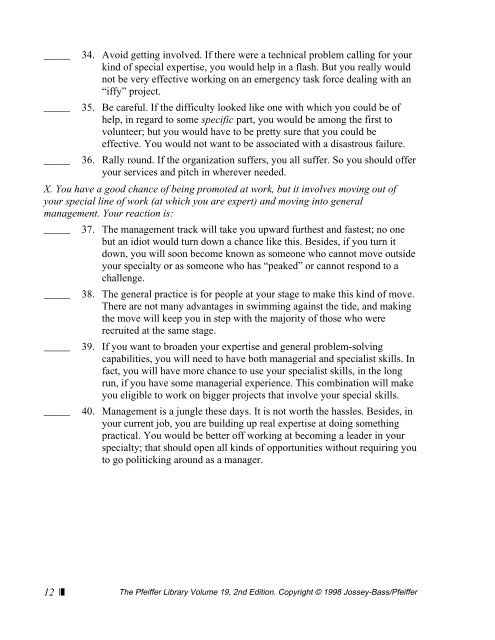motivational analysis of organizations
motivational analysis of organizations
motivational analysis of organizations
You also want an ePaper? Increase the reach of your titles
YUMPU automatically turns print PDFs into web optimized ePapers that Google loves.
_____ 34. Avoid getting involved. If there were a technical problem calling for your<br />
kind <strong>of</strong> special expertise, you would help in a flash. But you really would<br />
not be very effective working on an emergency task force dealing with an<br />
“iffy” project.<br />
_____ 35. Be careful. If the difficulty looked like one with which you could be <strong>of</strong><br />
help, in regard to some specific part, you would be among the first to<br />
volunteer; but you would have to be pretty sure that you could be<br />
effective. You would not want to be associated with a disastrous failure.<br />
_____ 36. Rally round. If the organization suffers, you all suffer. So you should <strong>of</strong>fer<br />
your services and pitch in wherever needed.<br />
X. You have a good chance <strong>of</strong> being promoted at work, but it involves moving out <strong>of</strong><br />
your special line <strong>of</strong> work (at which you are expert) and moving into general<br />
management. Your reaction is:<br />
_____ 37. The management track will take you upward furthest and fastest; no one<br />
but an idiot would turn down a chance like this. Besides, if you turn it<br />
down, you will soon become known as someone who cannot move outside<br />
your specialty or as someone who has “peaked” or cannot respond to a<br />
challenge.<br />
_____ 38. The general practice is for people at your stage to make this kind <strong>of</strong> move.<br />
There are not many advantages in swimming against the tide, and making<br />
the move will keep you in step with the majority <strong>of</strong> those who were<br />
recruited at the same stage.<br />
_____ 39. If you want to broaden your expertise and general problem-solving<br />
capabilities, you will need to have both managerial and specialist skills. In<br />
fact, you will have more chance to use your specialist skills, in the long<br />
run, if you have some managerial experience. This combination will make<br />
you eligible to work on bigger projects that involve your special skills.<br />
_____ 40. Management is a jungle these days. It is not worth the hassles. Besides, in<br />
your current job, you are building up real expertise at doing something<br />
practical. You would be better <strong>of</strong>f working at becoming a leader in your<br />
specialty; that should open all kinds <strong>of</strong> opportunities without requiring you<br />
to go politicking around as a manager.<br />
12 ❘❚<br />
The Pfeiffer Library Volume 19, 2nd Edition. Copyright © 1998 Jossey-Bass/Pfeiffer

















